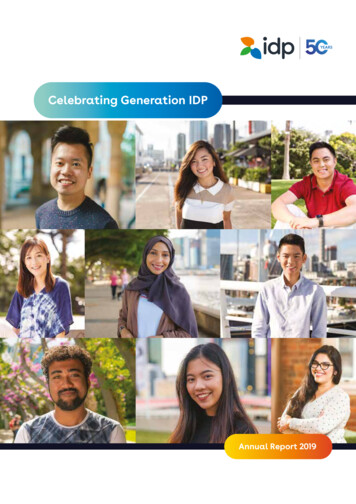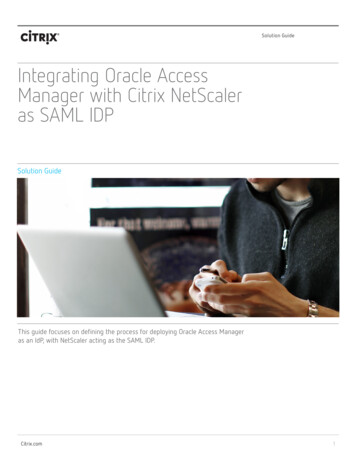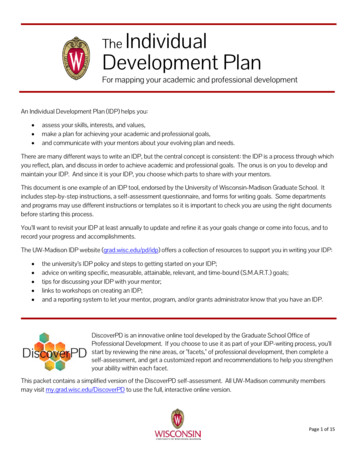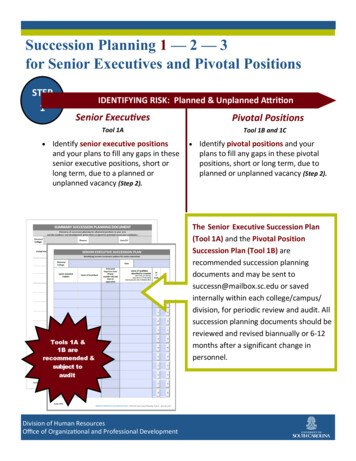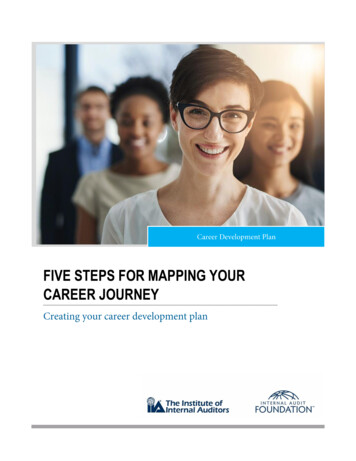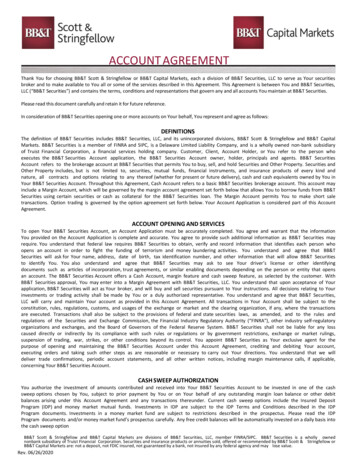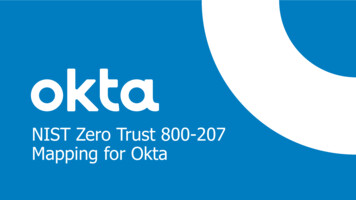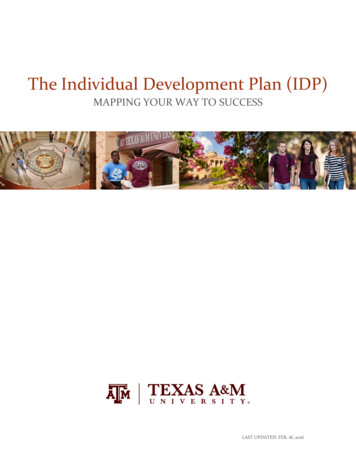
Transcription
The Individual Development Plan (IDP)MAPPING YOUR WAY TO SUCCESSLAST UPDATED: FEB. 18, 2016
The Individual Development Plan (IDP)What is the IDP?The Individual Development Plan (IDP) is an essential tool designed to helpgraduate students: Identify professional goals and objectivesAssess current skillsCommunicate with their advisor and mentor to develop an action plan toachieve short- and long-term objectivesYour IDP is a document you will want to revisit again and again, update and refineas your goals change and/ or come into focus, and track your progress andaccomplishments.Advisor(Support Your Academic Progress)IDPMentor(Facilitate Your Growth and Development)Success!PAGE 1
How to Create Your .-May)Discussion(Jul.-Aug.)3The Detailed Timeline for Developing the IDPYear 1ForGraduateStudentsFall SemesterSpring SemesterSummer Semester(Sept.-Dec.)(Jan.-May.)(Jun.-Aug.)1. Welcome to TexasA&M University!2. Identify your advisorand mentor.3. Visit them.1. New spring semesterstudents should identifyyour advisor and mentor.2. Visit your advisor andmentor.3. Make appointmentsduring the summer withyour advisor and mentorto discuss your IDP (unlessyou graduate beforeAugust).ForAdvisorsMeet with advisees.Meet with advisees.1. Complete your IDP.2. Discuss your IDP withyour advisor.3. Write your actionplan.4. Meet with youradvisor and mentor tofinalize your action plan.1. Discuss the IDP withadvisees.2. Review their actionplans.PAGE 2
Year 2ForMentorsMeet with mentees.Meet with mentees.Review mentees’ actionplans and provideassistance.ForGraduateStudents1. Implement your plan1. Implement your plan2. Discuss your progresswith your advisor andmentor.2. Discuss your progresswith your advisor andmentor.1. Complete your newIDP.3. Make an appointmentduring the summer withyour advisor and mentorto discuss your new IDP(unless you graduatebefore August).3. Write your newaction plan.Track your advisees’progress and provideassistance.Track your advisees’progress and provideassistance.1. Discuss the IDP withadvisees.ForMentorsTrack your mentees’progress and provideassistance.Track your mentees’progress and provideassistance.Review mentees’ actionplans and provideassistance.ForGraduateStudents1. Implement your plan1. Implement your plan2. Discuss your progresswith your advisor andmentor.2. Discuss your progresswith your advisor andmentor.1. Complete your newIDP.ForAdvisorsYear 3 UntilGraduation2. Discuss your new IDPwith your advisor.ForAdvisorsForMentors4. Meet with youradvisor and mentor tofinalize your action plan.2. Review their actionplans.2. Discuss your new IDPwith your advisor.3. Make an appointmentduring the summer withyour advisor and mentorto discuss your new IDP(unless you graduatebefore August).3. Write your newaction plan.Track your advisees’progress and provideassistance.Track your advisees’progress and provideassistance.1. Discuss the IDP withadvisees.Track your mentees’progress and provideassistance.Track your mentees’progress and provideassistance.Review mentees’ actionplans and provideassistance.4. Meet with youradvisor and mentor tofinalize your action plan.2. Review their actionplans.PAGE 3
The IDP should include the below parts. Templates are provided (see page sAction Plan(During or After Discussion)Research GoalsProgress & ChallengeRecent InvolvementTotal Time & EffortDiscipline-specific ConceptualKnowledgeProfessional/Research SkillDevelopmentCommunication SkillsProfessionalismTeachingCareer DevelopmentProgram RequirementsFellowshipsWellnessSupportNegative FactorsOther Mentoring You ReceiveGoal PlanningGoal PrioritizationCommunicationFollowing UpTarget SkillsActivitiesAdditional ActionsFinancial SupportResearch TimelineOtherPhDYear1(M1)Year2 (M2 )Year1(D1)Year2(D2)Year3 (D3 ) : Recommended : OptionalPAGE 4
AcknowledgementsThis manual was adapted from the following universities:-Florida State University Graduate School ment/IndividualDevelopment-Plan-IDP-Stanford Biosciences ocess.html-Wisconsin-Madison Graduate School IDP: http://grad.wisc.edu/pd/idpPAGE 5
The Individual Development Plan (IDP)MAPPING YOUR WAY TO SUCCESSStudent NameAdvisor NameMeeting DateMentor NameMeeting DatePAGE 6
Research ProgressResearch Goals (D2 & D3 Only; M1, M2 & D1 Optional)What specific question does your research intend to answer?How familiar are you with the academic literature related to the topic?Do you have a good grasp of how this research fits into your lab as a whole?PAGE 7
Do you have a good grasp of how this research fits into your field as awhole?Do you have a clear plan and endpoint for your career &/or research?How confident are you in your ability to complete it on schedule?What are your near-term research goals?PAGE 8
Progress & Challenge (D2 & D3 Only; M1, M2 & D1 Optional)How do you feel your research is progressing?Describe any challenges you experienced in the past year.What actions have you taken to overcome these challenges?PAGE 9
Development ActivitiesRecent InvolvementList your recent involvement in the past year.Coursework / TrainingTeaching / MentoringProfessional DevelopmentService / OutreachConferences / PublicationsPAGE 10
Which experience(s) have been most valuable to you, your research, andyour professional goals?Total Time and EffortHow much of your total academic time and ear%%%%%%100%PAGE 11
SkillsDiscipline-specific Conceptual KnowledgeWeak (1) to Strong (5)Target skillsI want to improveTechnical skills related to my research area-Specific technical skill:① ②-Select③ ④ ⑤ N/A-Specific technical skill:① ②-Select③ ④ ⑤ N/A-Specific technical skill:① ②-Select③ ④ ⑤ N/ADetailed knowledge of my research area-Specific knowledge:① ②-Select③ ④ ⑤ N/A-Specific knowledge:① ②-Select③ ④ ⑤ N/A-Specific knowledge:① ②-Select③ ④ ⑤ N/A(D1, D2 & D3 only)Professional/Research Skill DevelopmentWeak (1) to Strong (5)Scientific method① ② -Select③ ④ ⑤ N/AAnalytical skills / Data analysis & interpretation① ② -Select③ ④ ⑤ N/AProblem-solving① ② -Select③ ④ ⑤ N/ACreativity / Developing new research directions① ② -Select③ ④ ⑤ N/ASearch strategies & critical evaluation of the literature① ② -Select③ ④ ⑤ N/AGrant applications① ② -Select③ ④ ⑤ N/AScientific publishing processes① ② -Select③ ④ ⑤ N/ABroad-based & cross-disciplinary knowledge acquisition① ② -Select③ ④ ⑤ N/AOther:① ② -Select③ ④ ⑤ N/AOther:① ② -Select③ ④ ⑤ N/ATarget skillsI want to improvePAGE 12
Communication SkillsWeak (1) to Strong (5)Writing for a general audience① ②-Select③ ④ ⑤ N/AWriting for a discipline-specific audience① ②-Select③ ④ ⑤ N/AOral presentation to a general audience① ②-Select③ ④ ⑤ N/AOral presentation to a discipline-specific audience① ②-Select③ ④ ⑤ N/ASocial media communication & etiquette① ②-Select③ ④ ⑤ N/AEmail communication & etiquette① ②-Select③ ④ ⑤ N/ANetworking inside your home department at TAMU① ②-Select③ ④ ⑤ N/ANetworking outside at TAMU① ②-Select③ ④ ⑤ N/AConnecting with mentors① ②-Select③ ④ ⑤ N/AAbility to give constructive feedback① ②-Select③ ④ ⑤ N/AAbility to receive constructive feedback① ②-Select③ ④ ⑤ N/AConflict resolution① ②-Select③ ④ ⑤ N/AOther:① ②-Select③ ④ ⑤ N/AOther:① ②-Select③ ④ ⑤ N/A(D1, D2 & D3 only)ProfessionalismWeak (1) to Strong (5)Respecting contributions of others① ②-Select③ ④ ⑤ N/ADemonstrating cultural competence① ②-Select③ ④ ⑤ N/AWorking with diverse groups① ②-Select③ ④ ⑤ N/AAvoiding conflict of interest① ②-Select③ ④ ⑤ N/ADemonstrating responsible academic & professional conduct① ②-Select③ ④ ⑤ N/ADemonstrating skills useful in diverse academic & professional settings① ②-Select③ ④ ⑤ N/AMotivating others① ②-Select③ ④ ⑤ N/AManaging projects & time① ②-Select③ ④ ⑤ N/AAssuming leadership positions① ②-Select③ ④ ⑤ N/AParticipating in service opportunities① ②-Select③ ④ ⑤ N/AOther:① ②-Select③ ④ ⑤ N/AOther:① ②-Select③ ④ ⑤ N/ATarget skillsI want to improveTarget skillsI want to improvePAGE 13
(D1, D2 & D3 only)TeachingWeak (1) to Strong (5)Mentoring① ②-Select③ ④ ⑤ N/ATutoring① ②-Select③ ④ ⑤ N/AUsing your discipline’s teaching pedagogy① ②-Select③ ④ ⑤ N/ALeading discussion section or lab① ②-Select③ ④ ⑤ N/ALecturing① ②-Select③ ④ ⑤ N/AServing as teaching assistant① ②-Select③ ④ ⑤ N/AOther:① ②-Select③ ④ ⑤ N/AOther:① ②-Select③ ④ ⑤ N/ACareer DevelopmentWeak (1) to Strong (5)CV / Resume building① ② -Select③ ④ ⑤ N/AEstablishing career goals① ② -Select③ ④ ⑤ N/AAwareness of career opportunities in your field① ② -Select③ ④ ⑤ N/AAttending career-oriented professional development workshops① ② -Select③ ④ ⑤ N/AExploring career-focused academic certificates① ② -Select③ ④ ⑤ N/ANetworking① ② -Select③ ④ ⑤ N/ALeadership Skills① ② -Select③ ④ ⑤ N/AManagement Skills① ② -Select③ ④ ⑤ N/AOther:① ② -Select③ ④ ⑤ N/AOther:① ② -Select③ ④ ⑤ N/ATarget skillsI want to improveTarget skillsI want to improvePAGE 14
MentoringProgram RequirementsWhat is your plan to fulfill home program requirements in the coming year?FellowshipsWhat fellowships are you applying to?PAGE 15
WellnessHow stressed are you? What are relaxing activities or hobbies that youusually do?What do you usually eat/drink? Do you have a balanced diet?Support (M1 & D1 only)What support resources do you have when you need help?PAGE 16
Negative Factors (M1 & D1 only)Are there any factors that you are concerned may negatively affect yourprogress? What help can your advisor and mentor provide?Other Mentoring You Receive (D2 & D3 only)i.e. Thesis committee members, Peer mentors, Collaborators OthermentoringThesis committeemembersAdditionalmentorsCollaborators inyour researchName(s) &Role(s)How often areyou meeting?Is thissufficient?Do you initiatemeetings?Need helpfinding orcoordinating?PAGE 17
GoalsAcademic/Professional Goal PlanningObjectives or skillsto be learnedPublish one articleApproaches andStrategiesFind the topic andcollaboratorsTimeframeBegin September 1stand complete byNovember 30thOutcomesSubmitted to anational conferencePAGE 18
Goal PrioritizationInsert goals from previous page.High PriorityLong TermNear Term(More than(Within the next6 months)6 months away)Low PriorityPAGE 19
Action PlanThe action plan is to be developed jointly by the graduate student, theadvisor, and the mentor during or after discussion.1) Communication (M1 & D1 only)What is the best way to set meetings and communicate with your advisor andmentor regularly?2) Follow upHow often do you and your advisor/mentor plan to meet?PAGE 20
3) Target SkillsWhat skills did you identify as important development targets for the comingyear? (From skill section on page 12-14)4) ActivitiesList any activities in which you and your advisor/mentor agree you shouldparticipate to achieve your objectives in the coming year.5) Additional ActionsIn order to aid your success, are there any additional actions that can beinitiated or continued by you? By your advisor/mentor?PAGE 21
6) Financial SupportIf you know, what will be your financial support for the next year?7) Research Timeline (D2 & D3 Only; M1, M2 & D1 Optional)What is the research timeline for completing your current projects andpublishing your work?8) OtherIs there anything else you would like to note from the discussions with youradvisor and mentor?PAGE 22
The Individual Development Plan (IDP) is an essential tool designed to help graduate students: Identify professional goals and objectives Assess current skills . Assuming leadership positions ① ② ③ ④ ⑤ N/A Participating in service opportunities ① ② ③ ④ ⑤ N/A Other: ① ② ③ ④ ⑤ N/A


